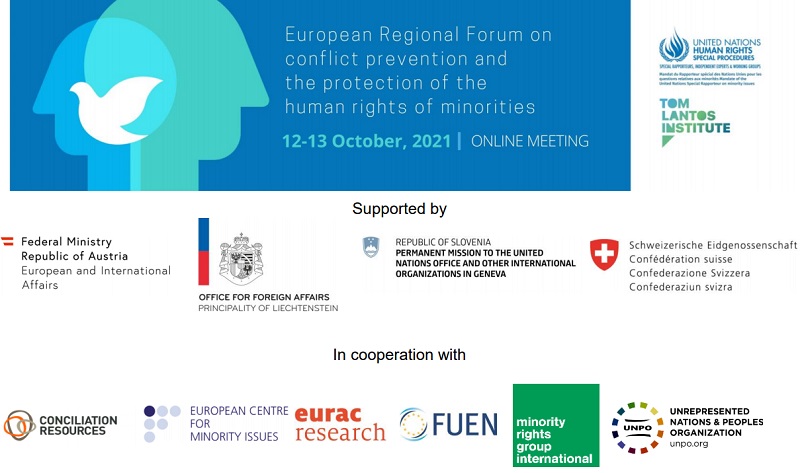On 12 and 13 October 2021 the United Nations Special Rapporteur on Minority Issues and the Tom Lantos institute organised the European Regional Forum on conflict prevention and the protection of the human rights of minorities.
“The main purpose of the European Regional Forum on “Conflict prevention and the protection of the human rights of minorities” is to provide regional insights, which will feed into the thematic work of the Special Rapporteur for his report to the 49th session of the UN Human Rights Council in March 2022. Furthermore, discussions will inform the work and recommendations of the 14th session of the Forum on Minority Issues, which will take place in Geneva in December 2021.”
Mr. Jeroen Zandberg held a speech at the European Regional Forum on 13 October 2021 about the human rights situation of the Cham-Albanian community where it relates to their loss of citizenship and property. The statement is copied below:
Distinguished guests,
I wish to briefly highlight the current human rights situation of the Cham-Albanian people as a result of their historical loss of citizenship and confiscation of their properties.
The Cham are an indigenous people with a Cham-Albanian language and culture who lived for many centuries in the historical region they called Chameria, which is now North-western Greece. In 1944, during World War Two, almost the entire Cham-Albanian population fled across the border to Albania to escape the war.
Among those refugees were persons who the Greeks considered collaborators and war criminals. These persons were sentenced, in absentia, and their Greek citizenship was removed. Three years later in 1947 under a special law, the entire Cham population, men, women and children, who fled to Albania, were stripped of their Greek citizenship. The Cham-Albanian people lived as refugees in Albania and were forcefully given Albanian citizenship in 1953.
The Cham-Albanian people lost their Greek citizenship in 1947, but they also lost their houses and properties. After the Cham-Albanian population had fled across the border to Albania, the Greek state seized their houses and properties. In 1953 Greece adopted a law that formalised the seizure of Cham properties by declaring all rural immovable properties abandoned if their original owner had left Greece without permission or passport. Furthermore, in 1959 Greece adopted another law which formally nationalised the houses of the Cham-Albanian people. Due to these laws the Cham lost legal ownership of the properties they had to leave behind during the war and it left them as impoverished refugees in Albania.
The Cham-Albanian people still mostly reside in Albania and have Albanian passports which grant them visa-free travel to the European Union countries and many other countries in the world as well. However, the Cham-Albanian people who hold valid Albanian passports and were born in Chameria are denied entry into Greece. This is due to a 2014 law that Albania implemented under pressure from Greece, which states that in the passport the country code should be placed after the city of birth. To the Greek authorities this means that all those born in Chameria need to have the letters “GRC” behind the place of birth in their passport, so as to acknowledge the Greek dominance over the region and that it is and always has been part of Greece. Albanian passports prior to September 2014 do not fulfil the Greek criteria, but are still valid documents. However, it provides the Greek border authorities with an excuse to deny the Cham-Albanians entry into Greece and is used as a means of intimidation to keep the Cham issue out of public discourse.
As a conclusion I wish the United Nations to take note of the following recommendations:
- For the Greek government to return Greek citizenship to those Cham-Albanians who were unjustly stripped of their citizenship.
- To return the confiscated houses and properties to their rightful owners.
- To allow Cham-Albanians with valid Albanian passports to cross the Albanian-Greek border.
Thank you,
Jeroen Zandberg
